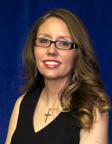Interview with Kelley McDonald, Past President of the Missouri Society of Radiologic Technologists
Kelley McDonald MS, RDMS RVT RT(R) is past president of the Missouri Society of Radiologic Technologists. In the following interview McDonald discusses her pragmatic viewpoint in choosing the field of radiology as a career. She makes a point of stating that her professional overview is always one of career over “job.”
What event or series of events led you to pursue the field of radiology as your professional choice? Please elaborate.
 It is not a glamorous or interesting story. I knew no one in radiology or healthcare. I looked in a book of professions that I received from a school counselor. I thought radiology sounded very cool and unique. I then researched schools that offered this degree. I always planned to pursue a bachelor’s degree so I searched and found a bachelor program in radiologic technology. The degree was declared before I ever even saw the front door to a hospital. I had SO much to learn and experience and I didn’t even know it. Good thing I ended up liking the field!
It is not a glamorous or interesting story. I knew no one in radiology or healthcare. I looked in a book of professions that I received from a school counselor. I thought radiology sounded very cool and unique. I then researched schools that offered this degree. I always planned to pursue a bachelor’s degree so I searched and found a bachelor program in radiologic technology. The degree was declared before I ever even saw the front door to a hospital. I had SO much to learn and experience and I didn’t even know it. Good thing I ended up liking the field!
Name 1 or 2 guidelines you would offer the radiology professional just entering the field?
Do your research! Look at the job markets in your area and have a clear idea of what specialty you may want to pursue after x-ray school. Some specialty programs do not require x-ray prior to admission to their program OR some go as far as to say you must be a registered RT prior to submitting an application. Knowing these nuances will help you pre-plan and take the best approach to meet your end-goal.
How would you advise an individual entering the radiology professions to proceed? What are the challenges, or obstacles that may be faced?
Take a look at several healthcare fields prior to making your final decision on radiologic technology. See what they do and shadow them. Make sure radiology is the right fit for you. Make sure that you pursue and finish your degree also. It will be very important in your career as you look for jobs and possibly move into upper level positions in the future. Don’t be satisfied with what you have. One last thing, get registered in everything that you do! It is of utmost importance to you, your facility and your patient. There are no excuses for not being professional and getting registered!
Can you give us an example of an interesting case or project that you have worked on and your role in helping to achieve a positive outcome?
I have been exceptionally blessed to be involved in many areas of imaging at a young age. I have educated in an online environment, helped develop a professional organization, volunteered many hours promoting the profession, lectured, encouraged and taken care of all kinds of patients. I have been able to volunteer at a crisis pregnancy clinic and work with a group on the basics of using an ultrasound machine that was headed to Uganda. I helped educate a student who lived on a remote island in Alaska and would be bringing this technology and service, for the first time, to a remote hospital and patient population.
What is the best career advice you have ever received? Name 1 or 2 guidelines you would offer the radiology professional just entering the field?
The best career advice I ever received was to never stop learning and pursuing something new. It can be easy to become stagnant or just punch a time clock. I never wanted to be complacent. It is WAY too boring for me. Luckily, there are always ways to learn more and improve one’s self. Look at what you are doing as a CAREER and not a “job.” You will be invested personally and emotionally and your patients will reap the benefits.
As an experienced professional in the radiology profession what role do you feel advanced technology is playing and what other advances do you foresee?
We, obviously, live and breathe technology. Imaging would not exist without it. We have to balance the advanced technology with healthcare reform and decreased reimbursements/budgets. Advanced technology can lead to better and more accurate diagnoses but it comes at a cost. This is the juxtaposition that we uniquely bear in imaging.
What is the key strength you bring to your career and how would you advise radiology professionals to mine their own strengths to further their careers.
My key strength is drive and determination. I have never been one to be settled with where I am. I pursue adventures and different ideas. I am open to new things. I despise the thinking that we cannot change because “we have always done it this way.” There are always new ideas and better ways to do things. At the very least, we have to be transparent and flexible to function. Why not be innovative and a change-agent?
We thank Kelley McDonald for generously sharing her career experiences and advice for new radiologic technologists. You can learn more about Kelley on LinkedIn.
